-
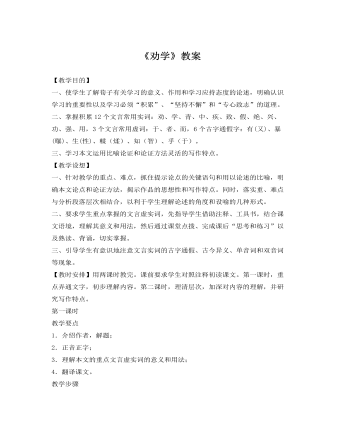
人教版高中语文《劝学》教案
(1)吾尝(曾经)终日而思矣,不如须臾(片刻)之所学也;吾尝肢(踮起脚跟)而望矣,不如登高之博见(看得广)也。(学、思对比,强调了学习的作用;跛望与登高对比,登高的收获大。两例证明利用学习、利用外物的作用。)(2)登高而招(招手),臂非加长也,而见者(看的人)远(远也看得见);顺风而呼(呼喊),声非加疾(快)也,而闻者(听的人)彰(听得更清楚)。(两例证明利用自然条件的作用。)(3)假(借助)舆马者(的人),非利足(快脚)也,而致(达到)千里;假舟楫者,非能水(善游)也,而绝(横渡)江河。(两例证明利用工具的作用。)(4)君子生(性)非异也,善假(利用)于(对)物(外物)也。连用比喻,得出结论:那些有才德的君子,生来本性与普通人没有什么两样(生非异也),只是由于他善于利用学得的知识和本领,善于利用处界条件弥补自身的不足,不断提高自己,所以才成为君子的。

人教版高中地理选修2三峡工程对生态环境和名胜古迹的影响及对策教案
一、三峡工程的生态环境效应三峡工程的生态环境效应是指建设三峡工程对生态与环境的有利和不利影响。1、有利影响(1)防洪:(2)防治血吸虫病:(3)减轻洞庭湖淤积(4)增加枯水期流量,改善水(5)调节局部气候:(6)减轻环境污染:综上所述,三峡工程对生态环境的有利影响主要在中下游。2、不利影响及措施(1)淹没土地、耕地:水库蓄水将淹没土地、耕地。(2)加剧水土流失和环境污染:在移民开发和城市迁建过程中,处理不当可能产生新的水土流失和环境污染等问题。(3)诱发地质灾害(地震、滑坡):水库蓄水改变了原有地应力的平衡,可能诱发地震,并使库岸发生滑坡等地质灾害的可能性增大。(4)加重泥沙淤积:水库蓄水,使库区水流速度变慢,库区和库尾的泥沙淤积加重。
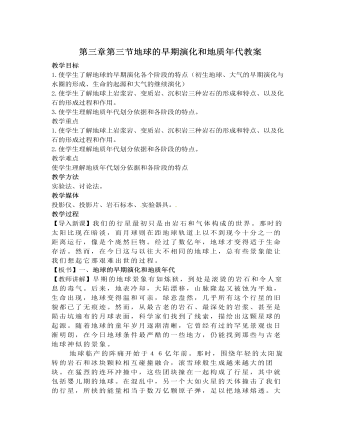
人教版高中地理选修1第三章第一节地球的早期演化和地质年代教案
地质年代可分为相对年代和绝 对年龄(或同位素年龄)两种。相对地质年代是指岩石和地层之间的相对新老关系和它们的时代顺序。地质学家和古生物学家根据地层自然形成的先后顺序,将地层分为5代12纪。即早期的太古代和元古代(元古代 在中国含有1个震旦纪),以后的古生代、中生代和新生代。古生代分为寒武纪、奥陶纪、志留纪、泥盆纪、石炭纪和二叠纪,共7个纪;中生代分为三叠纪、侏罗纪和白垩纪,共3个纪;新生代只有第三纪、第四纪两个纪。在各个不同时期的地层里,大都保存有古代动、植物的标准化石。各类动、植物化石出现的早晚是有一定顺序的,越是低等的,出现得越早,越是高等的,出现得越晚。绝对年龄是根据测出岩石中某种放射性元素及其蜕变产物的含量而计算出岩石的生成后距今的实际年 数。越是老的岩石,地层距今的年数越长。
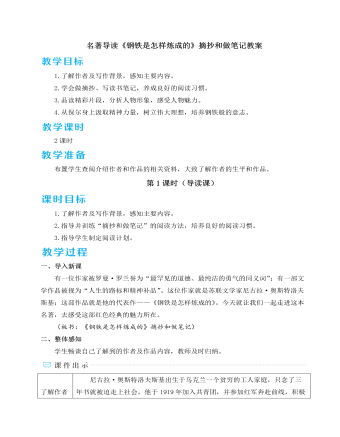
人教部编版语文八年级下册名著导读《钢铁是怎样炼成的》摘抄和做笔记教案
一团绿火像镁光似的在保尔眼前一闪,耳边响起了一声巨雷,烧红的铁片灼伤了他的脑袋。大地可怕地、不可思议地旋转起来,开始缓缓地向一旁倒下去。保尔像一根稻草似的被甩离了马鞍,越过马头,重重地摔倒在地。师:在那血与火的战争年代,保尔驰骋疆场,为革命事业浴血奋战,不惧牺牲。他那钢铁般的意志是在战火纷飞的疾苦中千锤百炼而成的。3.面对疾病师:病痛没有击垮保尔,面对自身的疾病,他是这样的——片段一:“……我受到一次又一次的打击。一次打击过后,我刚站起来,另一次打击,比上一次更无情的打击又来了。最可怕的是我无力反击。先是左臂不听使唤。这已经是够痛苦的了,谁知紧接着两条腿也不能活动。我原本就只能在室内勉强走动,现在甚至从床沿挪到桌子跟前也异常困难。可是,恐怕这还不算最糟的。明天会怎么样?谁也无法预料……”

人教版新目标初中英语七年级下册Where is the post office教案2篇
Period 2 (3a----Section B 2c)Preview(Pre-task): Key points: What laAdd another information about their pen pals----their language on the cardnguage does she/he speak?She/He speaks....Does she/he have any brothers and sisters? Does she/he speak English?Preview(Pre-task): Add another information about their pen pals----their language on the cardKey points: What language does she/he speak?She/He speaks....Does she/he have any brothers and sisters? Does she/he speak English?Step 1 Revision1.Revisionand dictation of the new words 2.Revise the drills they learned yesterday.(by pairwork and grammar exercise)Step 2 Leading-inT has a conversation with one student. The conversation is following:---Do you have a pen pal?---Yes, I do.---What's your pen pal's name? ---His/Her name is....---Where is your pen pal from? ---He/She is from...---Where does he/she live? ---He/She lives in....---What language does he/she speak?He/She speaks...Write the new words on the Bb. They are following: EnglishChineseJapaneseFrenchStep 3 LearnLearn the new words with the whole class.Finish 3a with the students3b Pairwork T still does an example with one student Then the Ss practise in pairs. The example is following:--Curry Muray is my pen pal. He is from the United States.---What language does he speak?
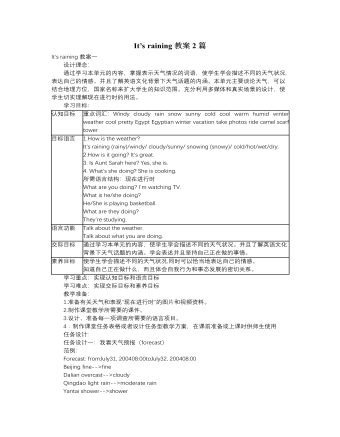
人教版新目标初中英语七年级下册It’s raining教案2篇
1 Each group choose one place to describe and what you are doing in it Choose one place, and describe what they are doing 2 Move around the room and give suggestions Talk about it and write it down 3 Ask one to show their works and act it Choose one of each group to make a report 4 Evaluate the best group and the best reporter Choose the best one Homework Ask your friends their ideal place and write about it教学反思:新课程标准中强调学生在课堂中的主体地位,在综合课中他们的主体地位就更加突出。在各个活动中给不同程度的学生不同层次的任务,让各层面的学生都有表现发挥的机会,从而产生对英语的兴趣。使用照片图片多媒体来辅助教学,效果更好。同时让了解其他国家风景,风俗的同学介绍ideal place,增加学生的背景知知识,实现跨学科交流的目的。教案点评:采用任务型教学模式,在各个活动中给不同程度的学生不同层次的任务,让各层面的学生都有表现发挥的机会,从而产生对英语的兴趣。使用照片图片多媒体来辅助教学,效果更好。让了解其他国家风景,风俗的同学介绍ideal place,增加学生的背景知识,实现跨学科交流的目的。
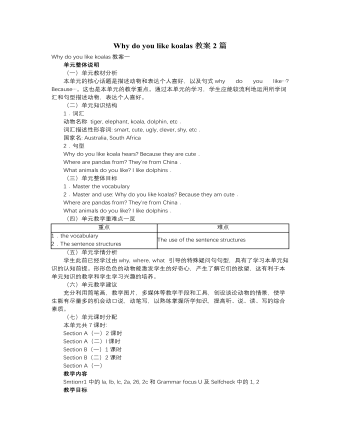
人教版新目标初中英语七年级下册Why do you like koalas教案2篇
单元整体说明(一)单元教材分析本单元的核心话题是描述动物和表达个人喜好,以及句式why do you like…? Because…。这也是本单元的教学重点。通过本单元的学习,学生应能较流利地运用所学词汇和句型描述动物,表达个人喜好。(二)单元知识结构1.词汇动物名称 tiger, elephant, koala, dolphin, etc.词汇描述性形容词: smart, cute, ugly, clever, shy, etc.国家名: Australia, South Africa2.句型Why do you like koala hears? Because they are cute.Where are pandas from? They're from China.What animals do you like? I like dolphins.(三)单元整体目标1.Master the vocabulary2.Master and use: Why do you like koalas? Because they am cute.Where are pandas from? They're from China.What animals do you like? I like dolphins.(四)单元教学重难点一览(五)单元学情分析学生此前已经学过由why, where, what 引导的特殊疑问句句型,具有了学习本单元知识的认知前提。形形色色的动物能激发学生的好奇心,产生了解它们的欲望,这有利于本单元知识的教学和学生学习兴趣的培养。

人教版新目标初中英语九年级下册We’re trying to save the manatees教案2篇
本单元主要围绕着有关濒临灭绝的动物这一话题,学习了应该怎样保护我们的环境,以及就某一问题展开辩论。目标提示语言目标能够运用所学知识,就某一问题展开辩论。认知目标1、复习一些语法:现在进行时、一般现在时、用used to 表示一般过去时、现在完成时、一般过去时的被动语态。2、学会表达同意和不同意。3、学会以下基本句型:We’re trying to save the manatees.Manatees eat about 100 pounds of food a day.There used to be a lot of manatees.In 1972,it was discovered that they were endangered.Some of the swamps have become polluted.情感目标了解一些濒临灭绝的动物的生活习性和濒临灭绝的原因,教育学生应该如何保护环境。教学提示充分利用多媒体等教学设备,创设与本课话题相关的情境,如各种不同种类的动物、动物园以及有关环境的画画等等。围绕着本单元的教学目标,设计一些贴近学生实际的教学任务,如让学生谈论自己最喜欢的动物,如何拯救濒危动物,如何保护环境等等。让学生根据所学知识,就动物园是否对动物有利以及其他的话题进行辩论。

人教版新目标初中英语七年级下册How was your weekend教案2篇
Teaching Goal:1. General aims:Talk about recent past events2. Particular aims:A. Language Focus.Talk about recent past events and think of the past events.B. Language goalsHow was….?It was …What did …do over the weekend?C. Language structures:(1). How was your weekend? I was great. Pay attention to no form.(2). What did you do over the weekend? I played soccer. We went to the beach.D. Useful words and phrases:Words: was, did, went, beach, over, project, test, wasn’t, false, number, geography, spend, week, most, mixture, their, had, little, cook, read, saw, change, everyone, sit, sat, no, anythingPhrases: did one’s homework, played soccer, cleaned my room, went to the beach, played tennis, went to the movies, on Saturday morning, over the weekend, cook … for, what about, do some reading, have a party, talk show, go shoppingE. Grammar language:Present simple past tenseRegular and irregular verbsF. Learning strategies:Tour and holidaysG. Interdiscipinary:H. Emotion and manner:Teaching time: 5 periodsTeaching procedures:Period One教学步骤、时间 教师活动 学生活动 媒体应用Step 1Free talk 3’ Ask some questions like:Who’s on duty today?What’s the weather like? Answer and talk about something.让同学们回答下列问题1. Do you like weekend? (Let some students answer)It takes them three minutes to talk about the question.2. Why do you like weekend? (let the students answer) Most of the students like the weekend此时教师用汉语问:“在周末期间问你干了什么?这句话用英语这么回答?Let the students guess.At last the teacher give them right answer3. What did you do over the weekend?(板书、学习)
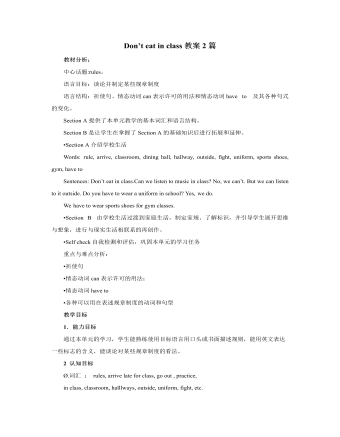
人教版新目标初中英语七年级下册Don’t eat in class教案2篇
Don’t fight. =You can’t fight. (板书,教读)教师把这些句子板书在黑板上,并请学生大声整齐地读祈使句和“can’t”句型,并让学生注意两种句型表达形式的不同和转换,“Don’t …=You can’t…”;并对学生说:These are our school rules. (板书,教读) You can’t break the school rules. Don’t break the school rules.(板书,教读)步骤3 :Practicea. T: Now, each of the students is breaking one of these rules.Please finish 1a.学生看图,完成1a的内容,检查答案并大声朗读校规。b. 听录音,完成1b,选出四位学生都违反了哪条校规;听之前,学生要读会英文名。c. 请两位学生朗读1c部分的句型;要求学生两人一组对话表演,SA扮演外校转来新生,SB告知本校校规。(学生可经过讨论,多说出他们想到的校规,不必只限于书上;教师应给予帮助)2) 第二课时(2a~4)步骤1 :warming up of revisionT: What are the rules at your school?学生使用“can”或祈使句表达各条校规;其中老师可引出“eat in the cafeteria outside”的表达。步骤2 :Practicea.T: Christina is an exchange student. She doesn’t know the rules. Let’s listen, what activities they’re talking about?学生听第一遍时,完成2a;第二遍时,完成2b;b. 请学生领读2c部分,看着2a完成的表格,理解2c活动的要求;分成小组针对2a进行问答;
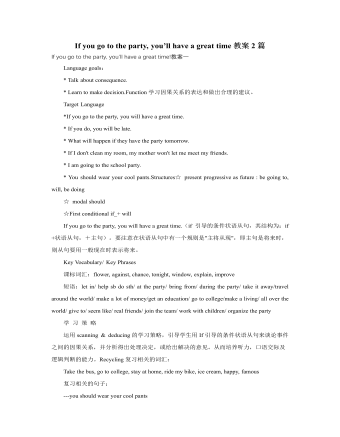
人教版新目标初中英语八年级下册If you go to the party, you’ll have a great time教案2篇
区分宾语从句、定于从句和状语从句宾语从句和状语从句,都叫做主从复合句。宾语从句主要是中考必考的,是初中阶段必掌握的从句,宾语从句主要是掌握三要素,所谓宾语从句,就是宾语在主从复合句当中充当宾语的一个句子,叫做宾语从句。主句的谓语动词是及物动词,后面如果是词或者是短语的话,是简单句,如果是句子的话,肯定是宾语从句。I know that he good at English.就是宾语从句,三要素,一要素是要注意连词,连词一共学了三类连词,一类连词是that口语当中可以省略,就像刚才说的那一句,I hear he is good at English.还有疑问代词、疑问副词,how where when,疑问代词、疑问副词。还有一类连词weather是否的意思,不是状语从句当中的如果,这一定要和如果区分开,这是是否。I don't know if he interested at English。宾语从句要注意if是连词。第二要素是语序,要用陈述举语序。比如说你家有几口人,我们都说How many people are there in you family?但是这是简单句,一旦说成宾语从句,你可以告诉我你家有几口人吗?Could you tell me how many people there are in you family ?

人教版新目标初中英语八年级下册It’s a nice day, isn’t it教案2篇
"Hello! Welcome to English class! Introduce yourself. Meet your new classmates." That's what the teacher says. What do you say? "Oh no!" It can be difficult talking to new people. But it can be fun, and you can make friends. How do you do it? Make small talk. Small talk is polite conversation. "Wang Nan is a great pingpang player, isn't she?" "I'd love to meet her, wouldn't you?" "It's been raining a lot, hasn't it?" Tag questions are a form of polite speech. To make small talk successfully, you should know how to make them. You should also know what topics to talk about. Try to learn this unit carefully. The next time you're in English class, you'll find out. Making small talk's easy, isn't it? (“你好!欢迎你!请做一下自我介绍。认识一下你的新同学。”通常在课上老师会这样说。你会说什么呢?“噢,不!”与陌生人谈话太困难了。但是这也很有意思,并且你还能交到朋友。你该怎么做呢?闲聊。闲聊指得是礼貌的对话。“王楠是一个很棒的乒乓球运动员,不是吗?”“我希望自己能认识她,你呢?“今年的雨水很多,不是吗?”反意疑问句是一种礼貌用语。为了使得谈话成功,你应该知道怎样去进行闲聊。你还应该知道与不同的人该谈论什么样的话题。认真的学习这个单元吧,下次在英语课上,你会发现与大家展开谈话是一件很容易的事情,不信我们来试试。)

人教版新目标初中英语八年级下册He said I was hard-working教案2篇
This activity introduces some new vocabulary and provide oral practice using the target language.Task 1 . Ask four students to stand in front of the class, and the teacher asks them the following questions as a reporter.1.What are you going to do when you grow up?2.What are you going to do next week?3.What are going to do after school?The students will give different answers, then ask a good student to report what they said.I am going to e a doctor.What did she say?----------She said she was going to be a doctor.I am going to have a party on Friday night.What did he say?-------He said he was going to have a party on Friday night.I am going to do my homework.What did she say ?------ She said she was going to do her homework.I am going home after school.What did she say?-----She said she was going home after school.Say In this unit we are going to learn to use words like to report what someone said.Task 2. Read the instructions. Then ask a student to read the four questions. And write the words on the Bb. Explain what soap opera is.Task 3. Ask the students to Look at the pictures, point out the TV screens in the picture. Ask one girl to read what Marcia said.What did Marcia say? She said She said she was having a surprise party for Lana on Friday night. Repeat the other pictures in the same way.Activity3. Listen and number the pictures in activity 1a.

人教版新目标初中英语八年级下册What were you doing when the UFO arrived教案2篇
(一).知识方面: 1.培养学生能运用过去进行时来描述、谈论过去某个时间正在发生的事情或动作的意识和能力,能就过去某个时间正在发生的动作做出正确的描述。 2.培养学生的想象力和角色扮演的合作能力。 3.培养学生讲述过去发生的事情经过的能力。能正确运用一般过去时来讲述故事。 (二).技能方面: 1.本单元的语言目标是Talk about past events and tell a story(谈论过去的时间和讲述一个故事),围绕这一目标,要涉及句型: What were you doing when the UFO arrived? ----I was sitting in the barber’s chair. The barber was cutting my hair. 因此必须学习standing、studying、cleaning、sleeping、cooking、making、eating、cutting、等表示地点的词,以便为上述句型提供语言材料。2.学习过去进行时的有关知识。Was/were+现在分词,是该时态的表达式。 3.在学习过程中,要区分The boy was walking down the street when the UFO landed.和While the boy was walking down the street, the UFO landed.这两种由when和while引导的状语从句的句型结构。注意它们的不同。
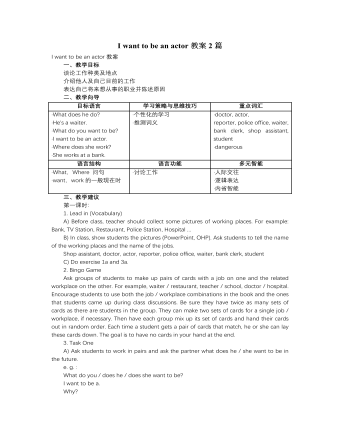
人教版新目标初中英语七年级下册I want to be an actor教案2篇
三、教学建议第一课时:1. Lead in (Vocabulary)A) Before class, teacher should collect some pictures of working places. For example: Bank, TV Station, Restaurant, Police Station, Hospital ...B) In class, show students the pictures (PowerPoint, OHP). Ask students to tell the name of the working places and the name of the jobs.Shop assistant, doctor, actor, reporter, police office, waiter, bank clerk, studentC) Do exercise 1a and 3a.2. Bingo GameAsk groups of students to make up pairs of cards with a job on one and the related workplace on the other. For example, waiter / restaurant, teacher / school, doctor / hospital. Encourage students to use both the job / workplace combinations in the book and the ones that students came up during class discussions. Be sure they have twice as many sets of cards as there are students in the group. They can make two sets of cards for a single job / workplace, if necessary. Then have each group mix up its set of cards and hand their cards out in random order. Each time a student gets a pair of cards that match, he or she can lay these cards down. The goal is to have no cards in your hand at the end.3. Task OneA) Ask students to work in pairs and ask the partner what does he / she want to be in the future.e. g. :What do you / does he / does she want to be?I want to be a.Why?Because it's (adj).B) Vocabulary: Section B, 1a4. Homework 1.2.
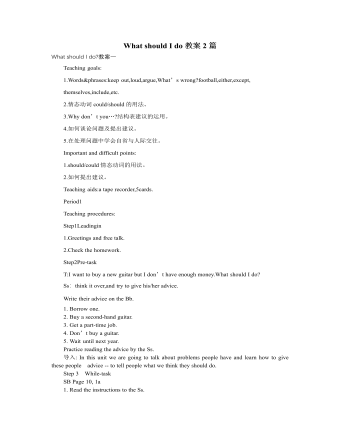
人教版新目标初中英语八年级下册What should I do教案2篇
说明:在帮Li Lei提建议的同时,教育学生如何学好英语。第三课时教学目标1. 语言目标:a) 词汇: Original, in style, haircut, the same as.b) 语言结构:My friend wears the same clothes and has the same haircut as I do.2. 能力目标:大多数学生能够谈论自己喜欢哪种服装,提高查找信息的能力。3. 情感目标:学会如何与朋友相处,要有自己对时尚的看法。教学重点掌握一些重要词汇。教学难点学会谈论问题,并能提出书面建议。◆教学突破首先针对Erin的问题,提出个人的建议,模仿2c部分的对话展开双人交际Pair-work;听老师诵读3a部分的信件,并找出LEFT OUT的问题所在;学生完成3b部分的内容,给Left Out提出书面的建议;学以口头形式提出自己目前存在的某个问题,讲给大家听,让同学们给自己提出一个建议,并作笔录;学生两、三个人分成一组,随意性地进行口语交际,谈论P14的第4部分的某个问题,相互交换意见。
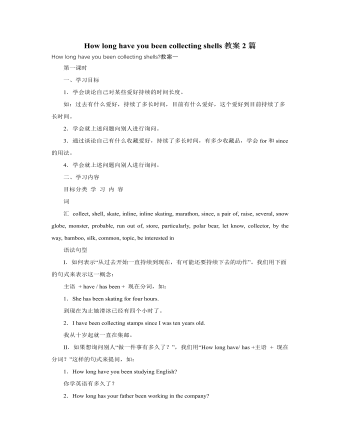
人教版新目标初中英语八年级下册How long have you been collecting shells教案2篇
Step Ⅱ Show the new words on the screen and teach the new words. Read the new words to students and ask them to repeat.Step Ⅲ 3aThis activity introduces new vocabulary and provides reading practice using the target language.In this activity first look at the four pictures.T: What can you see in the pictures?Ss: Four snow globes.T: Right. There are four snow globes in the pictures. And what are they?Ss: They are a monster, two polar bears, two penguins and a birthday cake.Write these words on the blackboard: snow globe; monster; polar bear; penguin and birthday cake. Read them to the class and ask students to repeat each one. Make sure students understand each word.Use a computer to show the E-mail message on the screen and read the message to students.Get students to read the e-mail on their own, and then draw lines connecting each snow globe and its description.Correct the answers.AnswersA line should connect each snow globe picture with the words that describe it in the letter.Step Ⅳ 3bThis activity provides writing practice using the target language.First review Activity 2a on Page 47.Then ask students to complete the message according to Activity 2a.Some partial sentences are given to students. Write about one person's collection.When students work, walk around the room checking the progress and offering help as needed.When they finish, ask some students to read their messages to the class.
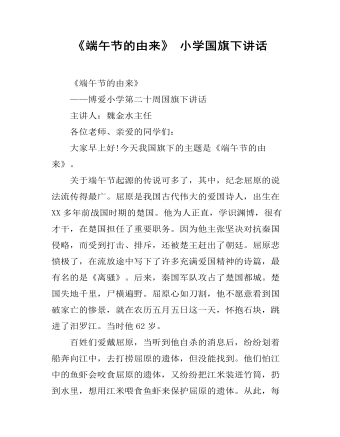
《端午节的由来》 小学国旗下讲话
各位老师、亲爱的同学们:大家早上好!今天我国旗下的主题是《端午节的由来》。关于端午节起源的传说可多了,其中,纪念屈原的说法流传得最广。屈原是我国古代伟大的爱国诗人,出生在XX多年前战国时期的楚国。他为人正直,学识渊博,很有才干,在楚国担任了重要职务。因为他主张坚决对抗秦国侵略,而受到打击、排斥,还被楚王赶出了朝廷。屈原悲愤极了,在流放途中写下了许多充满爱国精神的诗篇,最有名的是《离骚》。后来,秦国军队攻占了楚国都城。楚国失地千里,尸横遍野。屈原心如刀割,他不愿意看到国破家亡的惨景,就在农历五月五日这一天,怀抱石块,跳进了汨罗江。当时他62岁。百姓们爱戴屈原,当听到他自杀的消息后,纷纷划着船奔向江中,去打捞屈原的遗体,但没能找到。
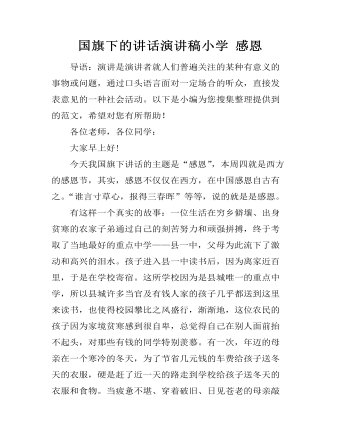
国旗下的讲话演讲稿小学 感恩
导语:演讲是演讲者就人们普遍关注的某种有意义的事物或问题,通过口头语言面对一定场合的听众,直接发表意见的一种社会活动。以下是小编为您搜集整理提供到的范文,希望对您有所帮助!各位老师,各位同学:大家早上好!今天我国旗下讲话的主题是“感恩”,本周四就是西方的感恩节,其实,感恩不仅仅在西方,在中国感恩自古有之。“谁言寸草心,报得三春晖”等等,说的就是是感恩。有这样一个真实的故事:一位生活在穷乡僻壤、出身贫寒的农家子弟通过自己的刻苦努力和顽强拼搏,终于考取了当地最好的重点中学——县一中,父母为此流下了激动和高兴的泪水。孩子进入县一中读书后,因为离家近百里,于是在学校寄宿。这所学校因为是县城唯一的重点中学,所以县城许多当官及有钱人家的孩子几乎都送到这里来读书,也使得校园攀比之风盛行,渐渐地,这位农民的孩子因为家境贫寒感到很自卑,总觉得自己在别人面前抬不起头,对那些有钱的同学特别羡慕。有一次,年迈的母亲在一个寒冷的冬天,为了节省几元钱的车费给孩子送冬天的衣服,硬是赶了近一天的路走到学校给孩子送冬天的衣服和食物。当疲惫不堪、穿着破旧、日见苍老的母亲敲开教室的门时,老师问她找谁,她说了自己孩子的姓名,然而,当老师问这位孩子她是你什么人时,这位孩子居然像犯了错误似的,脸涨得通红,小声地说她是我家的一个亲戚。当这句话传到站在门外把他含辛茹苦养育大的老母亲耳里时,老母亲愣住了,眼里涌出了泪花,她一句话也没说,把东西交给了老师,转身走进凛冽的寒风里。
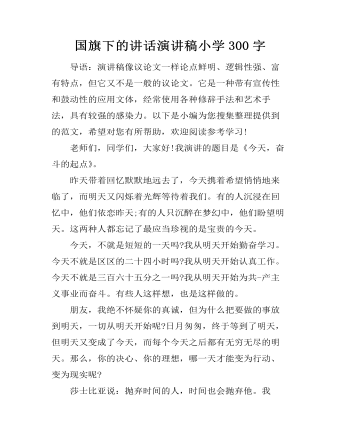
国旗下的讲话演讲稿小学300字
导语:演讲稿像议论文一样论点鲜明、逻辑性强、富有特点,但它又不是一般的议论文。它是一种带有宣传性和鼓动性的应用文体,经常使用各种修辞手法和艺术手法,具有较强的感染力。以下是小编为您搜集整理提供到的范文,希望对您有所帮助,欢迎阅读参考学习!老师们,同学们,大家好!我演讲的题目是《今天,奋斗的起点》。昨天带着回忆默默地远去了,今天携着希望悄悄地来临了,而明天又闪烁着光辉等待着我们。有的人沉浸在回忆中,他们依恋昨天;有的人只沉醉在梦幻中,他们盼望明天。这两种人都忘记了最应当珍视的是宝贵的今天。今天,不就是短短的一天吗?我从明天开始勤奋学习。今天不就是区区的二十四小时吗?我从明天开始认真工作。今天不就是三百六十五分之一吗?我从明天开始为共-产主义事业而奋斗。有些人这样想,也是这样做的。朋友,我绝不怀疑你的真诚,但为什么把要做的事放到明天,一切从明天开始呢?日月匆匆,终于等到了明天,但明天又变成了今天,而每个今天之后都有无穷无尽的明天。那么,你的决心、你的理想,哪一天才能变为行动、变为现实呢?莎士比亚说:抛弃时间的人,时间也会抛弃他。我说:抛弃今天的人,今天也会抛弃他;而被今天抛弃的人,他也就没有了明天。


